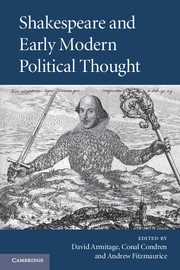Book contents
- Frontmatter
- Contents
- List of contributors
- Acknowledgements
- List of citations and abbreviations
- Introduction
- PART I CONTEXTS
- PART II THE COURT
- 5 Counsel, succession and the politics of Shakespeare's Sonnets
- 6 Educating Hamlet and Prince Hal
- 7 The corruption of Hamlet
- 8 Unfolding ‘the properties of government’: the case of Measure for Measure and the history of political thought
- 9 Shakespeare and the politics of co-authorship: Henry VIII
- PART III THE COMMONWEALTH
- Afterword: Shakespeare and humanist culture
- Index
7 - The corruption of Hamlet
Published online by Cambridge University Press: 18 January 2010
- Frontmatter
- Contents
- List of contributors
- Acknowledgements
- List of citations and abbreviations
- Introduction
- PART I CONTEXTS
- PART II THE COURT
- 5 Counsel, succession and the politics of Shakespeare's Sonnets
- 6 Educating Hamlet and Prince Hal
- 7 The corruption of Hamlet
- 8 Unfolding ‘the properties of government’: the case of Measure for Measure and the history of political thought
- 9 Shakespeare and the politics of co-authorship: Henry VIII
- PART III THE COMMONWEALTH
- Afterword: Shakespeare and humanist culture
- Index
Summary
Modern criticism of Hamlet has, perhaps unsurprisingly, been dominated by the idea of Hamlet's modern subjectivity, expressed (or, unexpressed) through his interiority. Immanuel Kant's influence looms large in this critical tradition. Samuel Taylor Coleridge introduced Kant to Hamlet, figuratively speaking, and they have subsequently been almost inseparable. Coleridge was profoundly moved by Kant's account of the creative imagination, and in turn he revealed Hamlet's self-reflexive life of the mind. Early twentieth-century discussions of Hamlet remained equally concerned by Hamlet's inner life. This critical preoccupation with Hamlet's interiority has only intensified in the historicist studies of Shakespeare of the past twenty years. Following Stephen Greenblatt, critics such as Francis Barker have used Hamlet's interiority to reveal modern subjectivity as emergent rather than given. The main challenge to this notion of subjectivity has come from feminist critics. But these critiques have added that the play Hamlet also describes an emergent gendered subjectivity. They have not questioned the notion of an emergent modern subjectivity itself, rather they have strengthened it.
I will argue that Shakespeare's contemporaries would have seen Hamlet not as a modern subject but as a man who withdraws from the corruption of political life. Hamlet is a play profoundly concerned with corruption and its impact upon self-understanding and political self-presentation. Readers of Hamlet have not failed to notice the commentary on corruption: it is surely one of the more obvious themes of the play. My aim here, however, is to place that concern in the context of early modern political thought.
- Type
- Chapter
- Information
- Shakespeare and Early Modern Political Thought , pp. 139 - 156Publisher: Cambridge University PressPrint publication year: 2009
- 3
- Cited by

